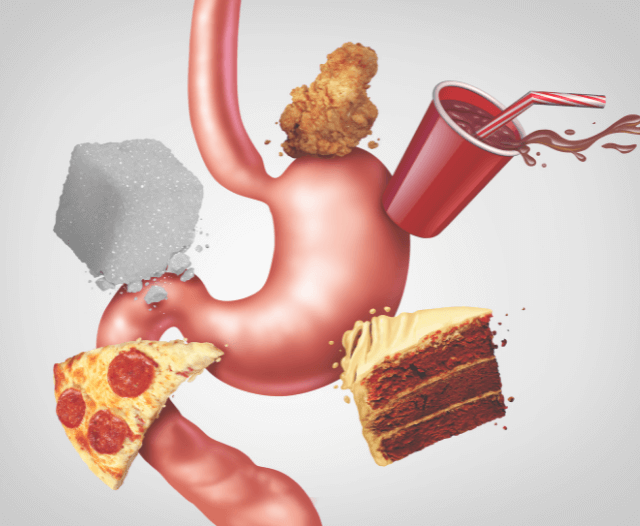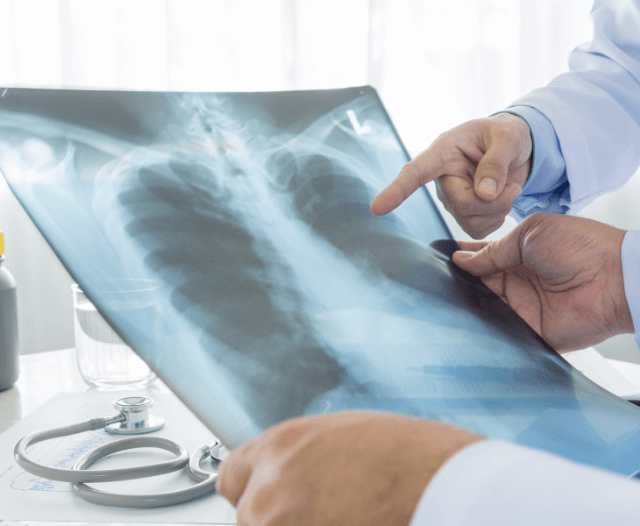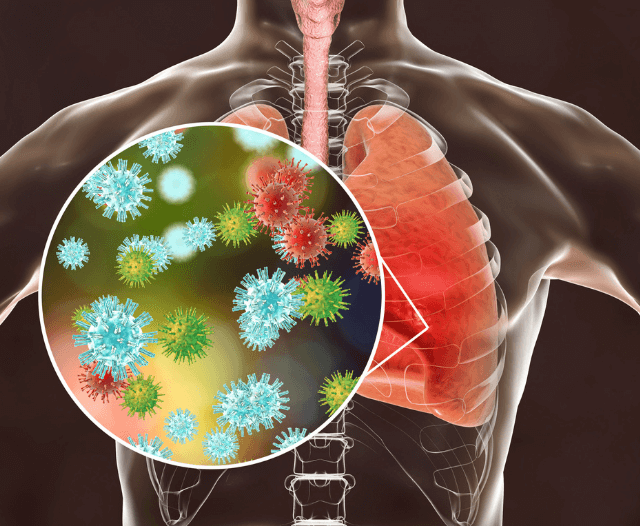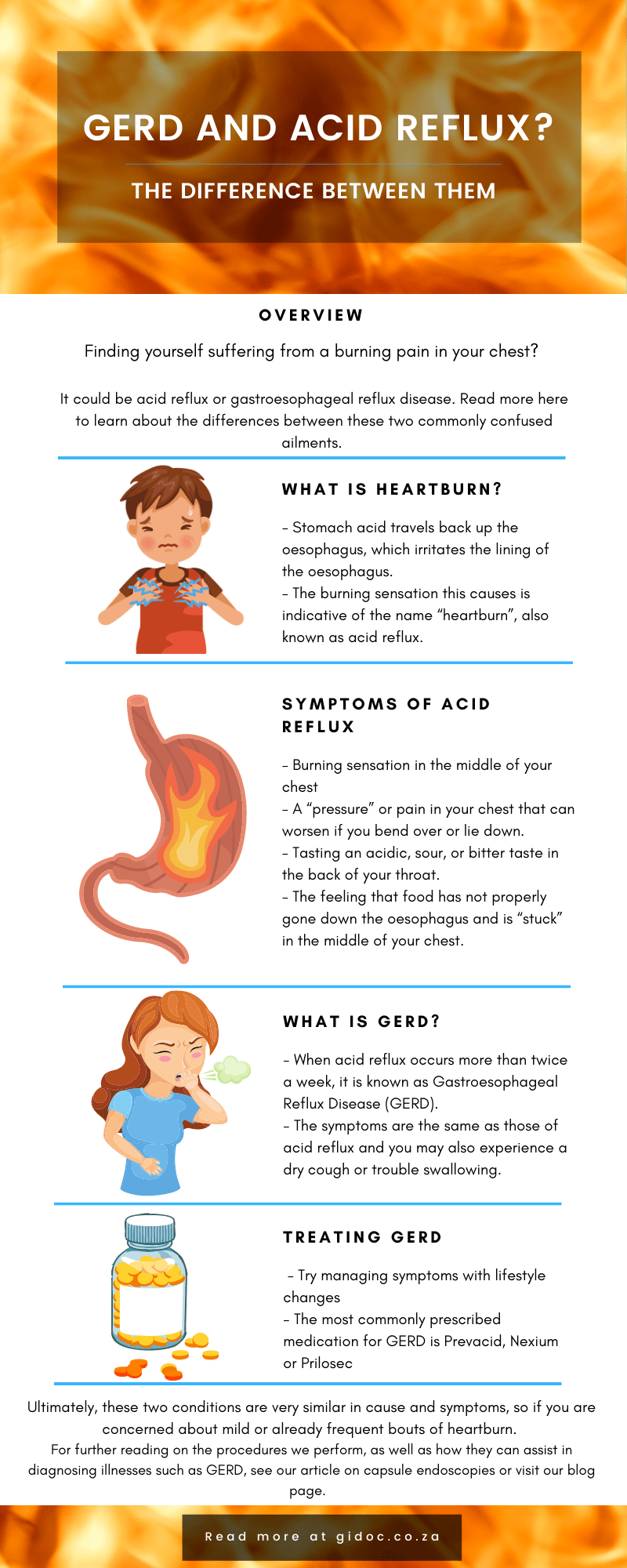Finding yourself suffering from a burning pain in your chest?
It could be acid reflux or gastroesophageal reflux disease. Read more here to learn about the differences between these two commonly confused ailments.
What is the Difference Between Gastroesophageal Reflux Disease (GERD) and Acid Reflux?
If you are experiencing a burning feeling in your chest, you probably already know you’re experiencing heartburn. Heartburn is not a condition on its own, and it has nothing to do with the heart.
Instead, it is the main symptom one experiences when suffering from acid reflux, which is when stomach contents come back up in your esophagus.
Often the reason for this is easily identified. For example, if you have eaten an extremely chilli heavy dinner or consumed a large amount of fizzy cooldrink, you may activate symptoms of acid reflux.
If this is happening on a regular basis (multiple times per week) it could be an indication that you’re suffering from a more serious condition called gastroesophageal reflux disease (GERD).
Understanding the differences between acid reflux and GERD involves understanding the links between each.
This article will explore what each of these conditions are, their differences, similarities and symptoms, as well as how they relate to one another.

What is Heartburn?
While eating, you swallow food that travels down the esophagus into your stomach.
Here there is a ring of muscles called the lower esophageal sphincter (LES) which tightens and acts as a barrier to keep the food in your stomach.
Experiencing heartburn indicates that the LES is either weak or is not closing properly.
This allows stomach acid to travel back up the esophagus, which then irritates the lining of the esophagus. The burning sensation this causes is indicative of the name “heartburn”, also known as acid reflux.
Symptoms of Acid Reflux
- An unpleasant burning sensation, typically experienced in the middle of your chest that can last between a few minutes to a few hours.
- A “pressure” type feeling or pain in your chest that can worsen if you bend over or lie down.
- Tasting an acidic, sour, or bitter taste in the back of your throat.
- The feeling that food has not properly gone down the esophagus and is “stuck” in the middle of your chest.

Causes of Acid Reflux
- Smoking or regular exposure to second-hand smoke
- Consuming alcohol
- Presence of a hiatal hernia
- Eating large meals
- Eating late at night or just before bed
- Consuming high-fat or fried foods
- Acidic drinks, such as fruit juice
Various medications can also trigger acid reflux, including:
- Asthma medication
- High blood pressure medication
- Antidepressants
- Antihistamines
- Pain relievers
- Sedatives

How to Avoid Heartburn
If you are prone to experiencing heartburn, you can minimise this by looking at your lifestyle and making some changes to reduce these bouts.
You typically would not need to be on medication for heartburn as these lifestyle changes are usually effective enough:
- Make a note of the foods that you eat that trigger bouts of heartburn for you. These could include acidic, spicy, fried, or fatty foods. Some people also experience acid reflux when drinking caffeine or alcohol.
- Not eating big meals soon before bedtime, as staying upright after consuming large amounts of food encourages digestion.
- Losing weight, as obesity can add to the weakening of the lower esophageal sphincter.
- If you happen to be a smoker, quitting will also assist with relieving symptoms.

What is GERD?
When acid reflux presents as a chronic condition, meaning it occurs more than twice a week, it is known as Gastroesophageal Reflux Disease (GERD).
If you suffer regular bouts of heartburn, it does not automatically mean that you will progress to having GERD.
The symptoms are the same as those of acid reflux (the burning sensation or lump in your chest) and you may also experience a dry cough or trouble swallowing.
Diagnosing GERD
Because GERD can occasionally be mistaken for simple acid reflux, your GP will be able to diagnose the illness by looking at the frequency and severity of symptoms that you are experiencing.
If the symptoms persist, especially any related to swallowing, the doctor may work with a gastroenterologist, surgeon, or another healthcare professional to confirm a diagnosis.
Your doctor may want to perform one or more of the following tests:
- Upper gastrointestinal (GI) endoscopy and biopsy. This procedure involves a camera being inserted down the food pipe to look inside the stomach, or sometimes to take a tissue sample.
- Upper GI series. Doctors will take X-rays of the body to look for complications such as a hernia, which may be causing the acid reflux.
- Esophageal pH and impedance monitoring. A thin tube is placed inside the food pipe for about 24 hours to measure acid levels over a full day.
- Bravo wireless esophageal pH monitoring. Acid levels are monitored by a small capsule that is inserted into the food pipe and a receiver outside the body that provides readings.
Treating GERD
As with acid reflux, the first port of call is to try managing symptoms with lifestyle changes before prescribing medication.
Yet, as seen above in the possible lifestyle changes, some are more difficult to change than others, like giving up smoking, for example.
If you and your GP decide it is necessary to look at medications to assist in managing your symptoms, the most commonly prescribed medication for GERD is a proton pump inhibitor (PPI), such as:
- Prevacid (lansoprazole)
- Nexium (esomeprazole)
- Prilosec (omeprazole)
The way that these PPI medications work is by decreasing the amount of acid produced by your stomach. It has been suggested that a two-month course of PPI can assist with healing of the esophageal lining that has been damaged by stomach acid.
Another medication option would be H2 blockers, which also decrease the production of stomach acid. These are conveniently available over the counter making them very easily accessible.
If your doctor diagnoses that your GERD symptoms are caused by hypersensitivity in the esophagus or excessive relaxation of the lower esophagus, you might be prescribed tricyclic antidepressants or selective serotonin uptake inhibitors.

Possible Complications by Delaying Treatment
The reason it is important to be aware of the differences between acid reflux and GERD is the fact that If GERD goes untreated, it can lead to more serious complications.
One such issue is esophagitis, which is inflammation in the esophagus. Leaving this untreated can lead to developing strictures; the narrowing of the intestine, in this instance the esophagus. This narrowing can cause esophageal pain and make it difficult to swallow.
GERD can also make one more susceptible to serious respiratory problems, such as pneumonia or laryngitis.
Another serious possible complication of GERD is a condition called Barrett’s Esophagus (BE). This condition causes the esophagus lining to thicken and become red due to stomach acid causing cells in the lining of the esophagus to look more like the stomach lining.
If this happens, there is an increased chance, albeit small, of developing esophageal cancer so it is important to have regular check-ups with imaging and biopsies of the esophagus to check for precancerous cells (dysplasia).
If precancerous cells are discovered in these check-ups, you have a good chance to deal with it early and they can be treated to prevent esophageal cancer.

Summary: How We Can Help You and Where to Find a GI Specialist
Ultimately, these two conditions are very similar in cause and symptoms, so if you are concerned about mild or already frequent bouts of heartburn, talk to us today about the possibility that you are suffering from GERD.
For further reading on the procedures we perform, as well as how they can assist in diagnosing illnesses such as GERD, see our article on capsule endoscopies or visit our blog page.
DISCLAIMER: PLEASE READ CAREFULLY
The information on this website is to provide general guidance. In no way does any of the information provided reflect definitive medical advice and self-diagnoses should not be made based on information obtained online. It is important to consult a Gastroenterologist or medical doctor regarding ANY and ALL symptoms or signs including, but not limited to: abdominal pain, haemorrhoids or anal / rectal bleeding as it may a sign of a serious illness or condition. A thorough consultation and examination should ALWAYS be performed for an accurate diagnosis and treatment plan. Be sure to call a physician or call our office today and schedule a consultation.
© Dr. Eduan Deetlefs, Registered Gastroenterologist, GI Doc Cape Town
Our website information is not intended or implied to be a substitute for professional medical advice, diagnosis or treatment. Please consult a doctor about your specific condition. Only a trained physician can determine an accurate diagnosis and proper treatment.


